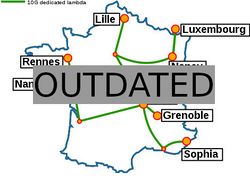Grid5000:Home
|
Grid'5000 is a large-scale and flexible testbed for experiment-driven research in all areas of computer science, with a focus on parallel and distributed computing including Cloud, HPC and Big Data and AI. Key features:
Grid'5000 is merging with FIT to build the SILECS Infrastructure for Large-scale Experimental Computer Science. Read an Introduction to SILECS (April 2018)
Older documents:
|
Random pick of publications
Five random publications that benefited from Grid'5000 (at least 2517 overall):
- Valentin Honoré, Bertrand Simon, Frédéric Suter. An Exact Algorithm for the Linear Tape Scheduling Problem. The 32nd International Conference on Automated Planning and Scheduling (ICAPS 2022), Jun 2022, Singapore, Singapore. pp.151-159, 10.1609/icaps.v32i1.19796. hal-03482022v3 view on HAL pdf
- Théophile Bastian, Hugo Pompougnac, Alban Dutilleul, Fabrice Rastello. CesASMe and Staticdeps: static detection of memory-carried dependencies for code analyzers. INRIA. 2024, pp.1-12. hal-04477227 view on HAL pdf
- Ajinkya Kulkarni. Expressivity transfer in deep learning based text-to-speech synthesis. Machine Learning cs.LG. Université de Lorraine, 2022. English. NNT : 2022LORR0122. tel-03844914 view on HAL pdf
- Vladimir Ostapenco, Laurent Lefèvre, Anne-Cécile Orgerie, Benjamin Fichel. Modeling, evaluating, and orchestrating heterogeneous environmental leverages for large-scale data center management. International Journal of High Performance Computing Applications, 2023, 37 (3-4), 10.1177/10943420231172978. hal-04047008 view on HAL pdf
- Gustavo A Salazar-Gomez. Transformer-based Lidar-RGB Fusion for Semantic Grid Prediction in Autonomous Vehicles. Computer Vision and Pattern Recognition cs.CV. 2022. hal-03943226 view on HAL pdf
Latest news
Failed to load RSS feed from https://www.grid5000.fr/mediawiki/index.php?title=News&action=feed&feed=atom: Error parsing XML for RSS
Grid'5000 sites
Current funding
As from June 2008, Inria is the main contributor to Grid'5000 funding.
INRIA |
CNRS |
UniversitiesUniversité Grenoble Alpes, Grenoble INP |
Regional councilsAquitaine |


